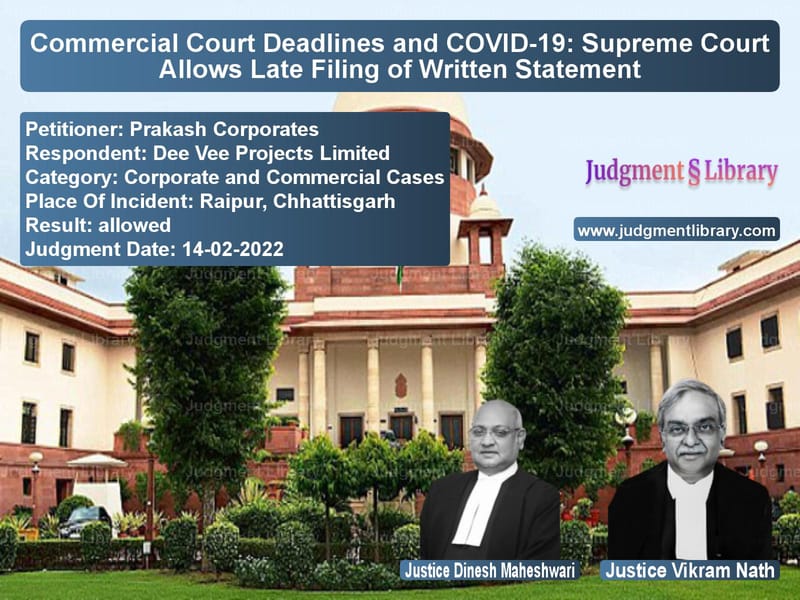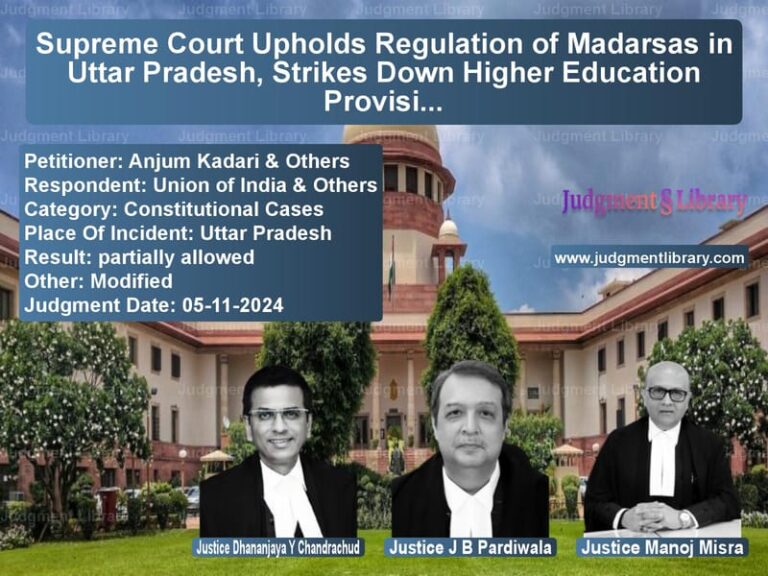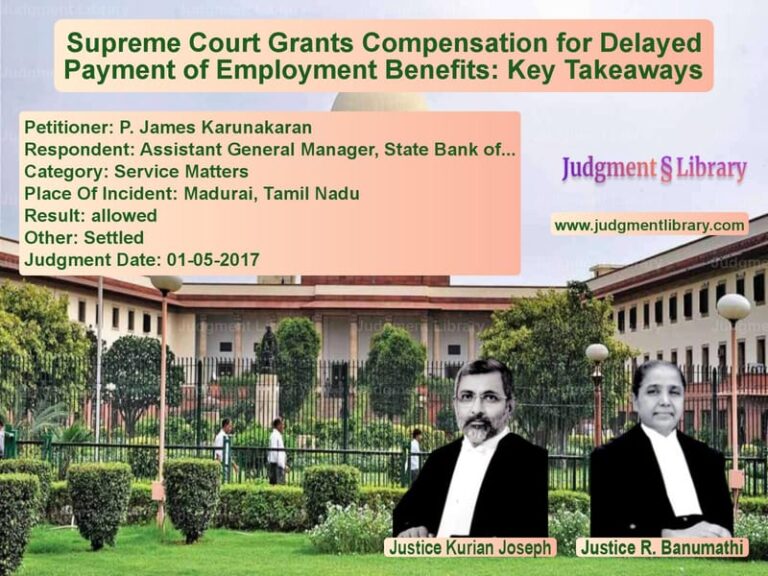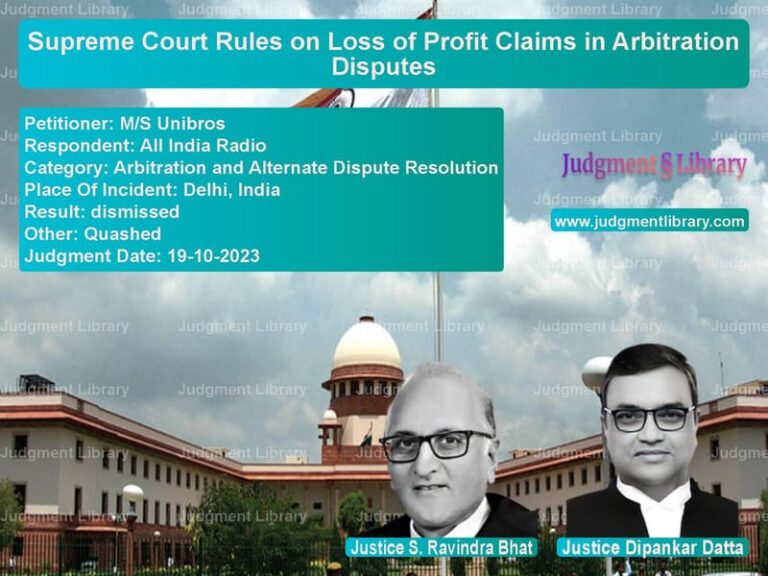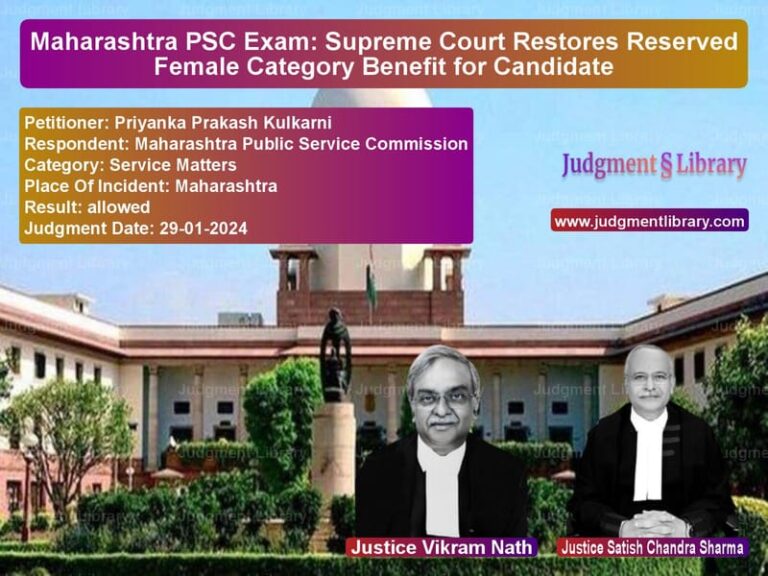Commercial Court Deadlines and COVID-19: Supreme Court Allows Late Filing of Written Statement
The Supreme Court of India delivered an important judgment in Prakash Corporates vs. Dee Vee Projects Limited, which addressed the issue of strict deadlines for filing a written statement under the Commercial Courts Act, 2015, and the impact of COVID-19 on legal timelines. The case examined whether the appellant’s right to file a written statement had been correctly forfeited due to delay, despite the Supreme Court’s own extension of limitation periods during the pandemic.
Background of the Case
The dispute arose from a commercial transaction between Prakash Corporates (appellant) and Dee Vee Projects Limited (respondent) related to sub-contract work on two major public infrastructure projects in Chhattisgarh. The respondent filed a suit against the appellant seeking recovery of excess payments made, amounting to ₹3,73,24,821, along with interest.
Key developments:
- On 06.01.2021, the appellant was served with summons to file a written statement within 30 days, extendable to 120 days as per the Commercial Courts Act.
- The appellant sought extensions on multiple occasions due to various difficulties, including legal consultations and the second wave of COVID-19.
- The Commercial Court (District Level) at Nava Raipur, Chhattisgarh, refused further extensions on 22.06.2021, stating that the right to file the written statement was forfeited.
- The appellant’s writ petition before the Chhattisgarh High Court was dismissed on 09.07.2021.
- The appellant moved the Supreme Court, citing difficulties due to the COVID-19 pandemic and orders passed by the Court extending limitation periods.
Petitioner’s Arguments
- The appellant argued that the Supreme Court’s suo motu order in SMWP No. 3 of 2020 extended limitation periods due to the pandemic, making the forfeiture of the right to file the written statement invalid.
- They claimed that the lockdowns, quarantine restrictions, and administrative orders curtailed normal court functioning, affecting their ability to file the statement on time.
- The appellant pointed out that the written statement had already been prepared and notarized on 07.07.2021, showing that there was no deliberate delay.
- It was argued that the High Court and the Commercial Court failed to account for the exceptional circumstances caused by COVID-19.
Respondent’s Arguments
- The respondent maintained that the Commercial Courts Act strictly mandates the filing of a written statement within 120 days from the date of service of summons.
- They argued that the Supreme Court’s orders extending limitation periods did not override specific statutory provisions, particularly where the law did not permit condonation of delay.
- The respondent asserted that the appellant had been appearing before the Trial Court and had ample opportunity to file the written statement but failed to do so.
Supreme Court’s Judgment
The Supreme Court ruled in favor of the appellant, setting aside the High Court’s order and allowing the late filing of the written statement.
Key Observations of the Supreme Court:
- The Court referred to its own suo motu orders in SMWP No. 3 of 2020, which extended all limitation periods during the pandemic.
- It held that the period between 15.03.2020 and 02.10.2021 must be excluded while computing limitation for filing a written statement.
- The Court ruled that administrative orders from the Chhattisgarh High Court restricting court functioning must also be considered.
- It found that the lower courts had failed to recognize the extraordinary circumstances caused by COVID-19, which impacted the appellant’s ability to comply with procedural deadlines.
- The Court emphasized that procedural deadlines must be interpreted in a manner that serves the cause of justice, especially in unforeseen situations like a global pandemic.
Key Excerpts from the Supreme Court Judgment
Regarding the impact of the pandemic, the Court stated:
“The extraordinary situation caused by the sudden and second outburst of COVID-19 Virus requires extraordinary measures to minimize the hardship of litigant–public in all the states. We, therefore, restore the order dated 23rd March, 2020, extending all limitation periods.”
On the forfeiture of the right to file a written statement, the Court held:
“The orders passed by this Court in SMWP No. 3 of 2020 were of extraordinary measures in extraordinary circumstances and their operation cannot be curtailed with reference to the ordinary operation of law.”
Regarding procedural fairness, the Court emphasized:
“We are constrained to reiterate the unquestionable principles that the rules of procedure are essentially intended to subserve the cause of justice and are not for the punishment of the parties in the conduct of proceedings.”
Final Verdict
The Supreme Court allowed the appeal and issued the following directions:
- The written statement prepared by the appellant on 07.07.2021 must be taken on record by the Commercial Court.
- The Trial Court must proceed with the case without treating the written statement as forfeited.
- The pending applications in the suit must be dealt with expeditiously.
Conclusion: Implications of the Judgment
This judgment has significant implications for commercial litigation and procedural law:
- It reinforces the Supreme Court’s authority in extending limitation periods during emergencies.
- It clarifies that procedural deadlines cannot be applied rigidly in extraordinary situations such as the COVID-19 pandemic.
- The judgment ensures that litigants are not penalized for delays caused by factors beyond their control.
- It sets a precedent for considering administrative court orders and external circumstances when determining compliance with procedural rules.
By upholding flexibility in commercial litigation timelines during exceptional circumstances, this ruling strengthens access to justice and ensures fairness in legal proceedings.
Petitioner Name: Prakash Corporates.Respondent Name: Dee Vee Projects Limited.Judgment By: Justice Dinesh Maheshwari, Justice Vikram Nath.Place Of Incident: Raipur, Chhattisgarh.Judgment Date: 14-02-2022.
Don’t miss out on the full details! Download the complete judgment in PDF format below and gain valuable insights instantly!
Download Judgment: prakash-corporates-vs-dee-vee-projects-lim-supreme-court-of-india-judgment-dated-14-02-2022.pdf
Directly Download Judgment: Directly download this Judgment
See all petitions in Company Law
See all petitions in Contract Disputes
See all petitions in Commercial Arbitration
See all petitions in unfair trade practices
See all petitions in Corporate Compliance
See all petitions in Judgment by Dinesh Maheshwari
See all petitions in Judgment by Vikram Nath
See all petitions in allowed
See all petitions in supreme court of India judgments February 2022
See all petitions in 2022 judgments
See all posts in Corporate and Commercial Cases Category
See all allowed petitions in Corporate and Commercial Cases Category
See all Dismissed petitions in Corporate and Commercial Cases Category
See all partially allowed petitions in Corporate and Commercial Cases Category

